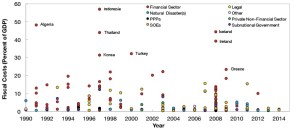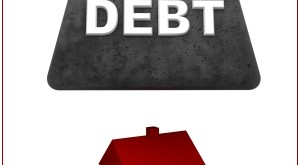In his blog, John Cochrane points to SoFi, a FinTech company, as proof that banking services can be delivered by institutions without the traditional characteristics of a bank. SoFi finances loans by selling equity. The loans are securitized and the cash is reinvested in loans. As John points out: A “bank” (in the economic, not legal sense) can finance loans, raising money essentially all from equity and no conventional debt. And it can offer competitive borrowing rates — the supposedly...
Read More »Great Graphic: Measuring Cost of Extend and Pretend
There is a debate. On one hand is Summers, who argues that modern economies have entered an era of secular stagnation. Full utilization of the factors of production and particularly capital and labor is not possible without stimulating aggregate demand in a way that facilitates bubbles. The broad strokes of the argument can be found implicitly or explicitly in much of the commentary and economic analysis. The other side of the debate includes economists like Bernanke, and Rogoff and...
Read More »Contingent Liabilities
On VoxEU, Elva Bova, Marta Ruiz Arranz, Frederik Toscani and Elif Ture discuss contingent liabilities. Their figure 2 illustrates contingent liability realizations by type and year:
Read More »Offener Brief an Alexis Tsipras
Sehr geehrter Premierminister Alexis Tsipras, Zunächst herzlichen Glückwunsch zur neu gebildeten Regierung.Leider hat sich damit nicht viel geändert. Der Euro bietet seit langem Griechenland einen perversen Anreiz Geld zu leihen. Nun ist Ihr Land in der Schuldenfalle. Durch herkömmliche Mittel kann Griechenland nicht zurückzahlen. Je früher man diese einfache Tatsache anerkennt, desto besser. Die Troika droht die Kosten des Ausscheidens aus dem Euro zu maximieren. Sie kann den Zugang zu...
Read More »The Fed and the Cotton Candy Market
As I have discussed previously, if you borrow cash then it’s not income. This is why no one in his right mind borrows to buy consumer goods. Those who try cannot sustain it for long.What if someone else borrows? Suppose someone else—let’s call her Jordyn—buys your house from you, at a higher price than you originally paid for it. You can spend some of the gain. Of course she is just paying you with her borrowed proceeds, but most people think this is totally different than if you borrow to...
Read More »US Debt Is Rising Again—But That’s a Good Thing
In the aftermath of the housing collapse, U.S. consumers did something they hadn’t done in years: they drastically reduced their debt loads. After peaking in 2008 at just over $11.5 trillion, household debt (the sum of mortgages, home equity lines of credit, auto loans, and credit card debt) was whittled down to under $10 trillion by the second quarter of 2013. But that, apparently, is when the deleveraging stopped. Over the past two years, household debt has once again been on the rise. But...
Read More »Keith Weiner: Open Letter to Alexis Tsipras
Dear Prime Minister Alexis Tsipras, First, congratulations for mustering the popular support to say “no” to the troika. The euro has long offered Greece a perverse incentive to borrow, and now your country is trapped in debt. By any conventional means, Greece cannot repay (I propose an unconventional way, below). The sooner everyone acknowledges this simple fact the better. While I don’t claim to know why you agreed to a bailout deal this weekend, I can guess. The troika threatened to...
Read More »Keith Weiner: Inflation Caused the Greek Tragedy
By inflation, I don’t refer to rising consumer prices in Athens. My Greek friends tell me that prices have been steady there in recent years. The focus on prices is the greatest sleight of hand ever perpetrated. It diverts your attention away from the real action. Inflation is the counterfeiting of credit. It is borrowing, when you can’t pay and you know it. Inflation is taking money under false pretenses, and issuing fraudulent bonds. This describes the Greek finances perfectly. Greece...
Read More »They’re Coming to Take Away Your Cash
The stories are all over the Internet. Governments are forcing us into a cashless society. Supposedly the pretext is terrorism, and the real reason is to take more control. No doubt more power appeals to politicians, and banning cash seems like the next step after mandatory reporting of cash transactions. However, I think there is a more serious driver than simple power lust. A more compelling case is that cash banning is the logical follow up to bail-ins. Most people think a bail-in is...
Read More » Swiss Economicblogs.org
Swiss Economicblogs.org





